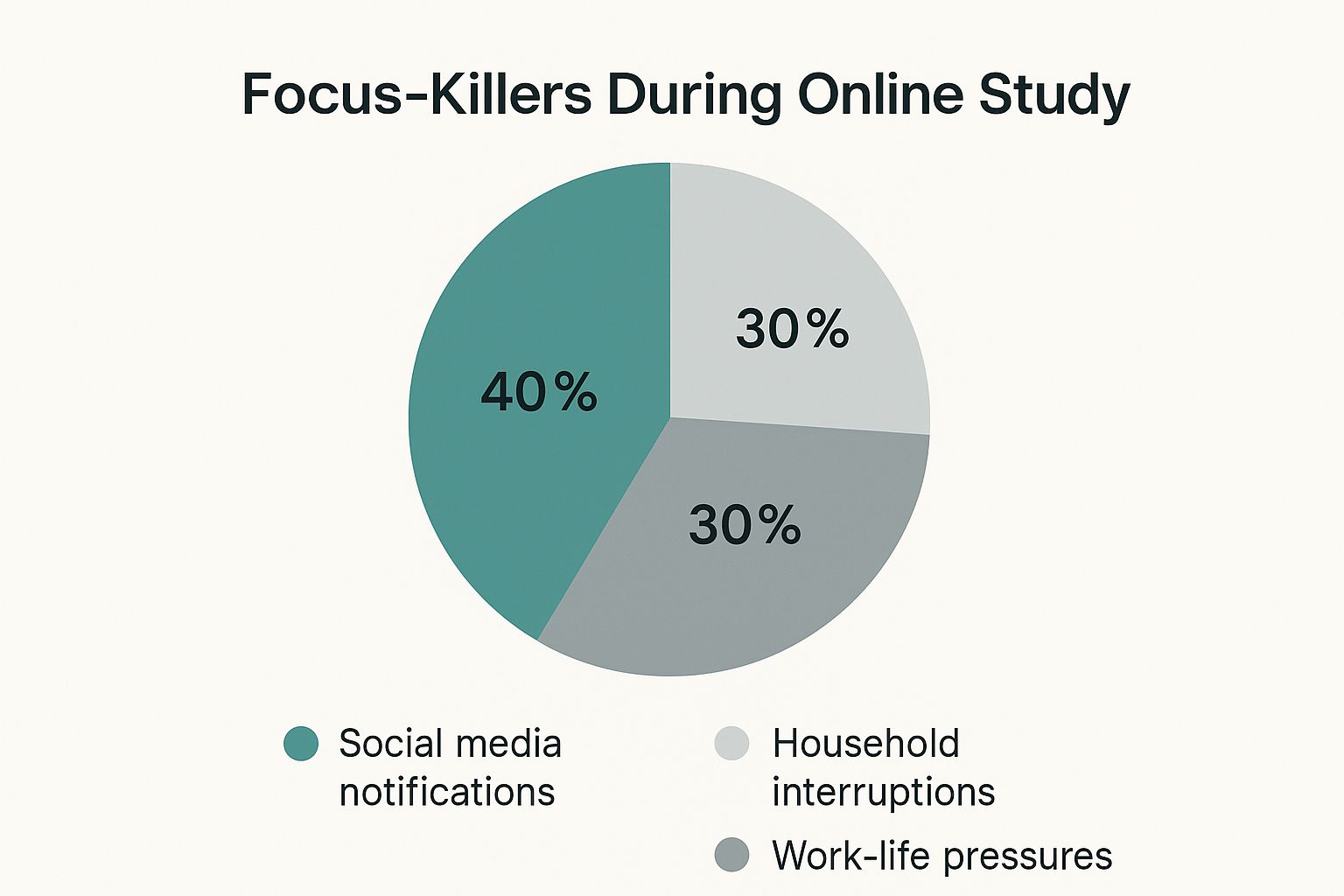
Are you struggling with how to stay focused while studying for your online course? You're not alone. When you're in charge of your own progress, without a teacher setting the pace, staying on track can be a challenge. Online learning offers amazing flexibility, but it also demands a whole new level of self-discipline.
This guide provides practical tips to help you keep your concentration, manage distractions, and succeed in your online studies. Keep reading to build a strategy that works for you.
Why Is It So Hard to Focus on Online Studies?
Let's be honest: trying to concentrate on your coursework when you're the one in the driver's seat can be tough. That freedom to study anywhere, anytime, is fantastic until your study space is also your living space. Suddenly, the lines between learning, work, and life become incredibly blurry.
If you find your mind wandering, it’s not a failure of willpower. It's a modern challenge. Digital pings from your phone, household chores piling up, and the endless scroll of social media are all fighting for your attention. The first step is to recognise these focus-killers for what they are.
Understanding Common Distractions
So, what are we up against? The main culprits behind a wandering mind are often external pressures and digital temptations. This infographic breaks down what typically pulls students away from their studies.

As you can see, digital notifications are a huge issue, but our real-world responsibilities are just as significant. To truly manage your focus, you have to tackle both fronts.
To give you a clearer picture, here’s a quick rundown of the things that can derail a study session.
Common Focus-Killers in Online Learning
|
Distraction Type |
Examples |
Impact on Focus |
|---|---|---|
|
Digital Interruptions |
Social media notifications, emails, text messages, news alerts |
Breaks concentration and pulls you into low-value, time-consuming activities. |
|
Household & Family |
Chores, family members needing attention, pets, unexpected visitors |
Creates unpredictable interruptions that make it hard to get into a deep work rhythm. |
|
Work & Life Pressures |
Juggling a job, managing finances, personal appointments, burnout |
Leads to mental fatigue and anxiety, making it difficult to absorb new information. |
|
Environmental Factors |
Uncomfortable workspace, background noise, poor lighting, clutter |
Creates physical discomfort and sensory overload, distracting you from your tasks. |
This table shows it's a mix of things you can control (like notifications) and things that are harder to manage (like family needs). The goal is to build a system that minimises the impact of both.
For many students in the UK, balancing work and studies adds another layer of difficulty. A recent survey revealed that 68% of full-time undergraduates now have a job during term time, a sharp increase driven by cost-of-living pressures. This has led to a drop in average independent study time, making every focused session more critical than ever.
The key is to reframe focus not as something you either have or don't, but as a skill you can build. Understanding that finding online learning hard is a common experience is the first step toward taking practical control.
Once you recognise these challenges, you can start building a strategy to overcome them. It's about making real, tangible progress in your online courses so you can finally achieve your learning goals.
Engineer Your Environment for Deep Focus
Your surroundings have a massive impact on your ability to concentrate when you’re studying online. You can't just hope for focus to show up; you need to consciously build an environment where it can actually thrive. This means tackling both your physical space and your digital world with a clear strategy.
The aim is to cut down on what experts call mental friction—that constant, low-level effort it takes to push distractions away. When your study space is a mess and your phone is buzzing, your brain has to work overtime just to stay on task. Engineering your environment makes focusing the path of least resistance.

Create a Dedicated Study Zone
Even if you don't have a separate office, carving out a dedicated study zone is non-negotiable. Doing this trains your brain to associate a specific area with learning, sending a clear signal that it’s time to get down to business.
It doesn’t have to be anything grand. A small corner of a room, a particular chair at the kitchen table, or even a portable lap desk can work wonders. Consistency is what really matters. When you’re in that spot, you study. When you leave, you switch off. This clear boundary helps stop the lines between home and study life from becoming hopelessly blurred.
If you’re looking for a bit more inspiration, our detailed guide on how to find your perfect study space has plenty of ideas.
Declutter Your Digital World
These days, your digital space is just as important as your physical one. Technology is central to how we learn, especially in the UK where the education tech sector is valued at around £3.2 billion. With 90% of UK learners choosing online study for its flexibility, managing your digital world is a skill you have to master.
So, how can you take back control?
-
Silence Notifications: This is the single most powerful thing you can do. Turn off every non-essential notification on your phone and computer. A single ping can completely derail your concentration for several minutes.
-
Use Website Blockers: Tools like Freedom or Cold Turkey are brilliant for blocking distracting websites for set periods. They remove the temptation to "just quickly check" your social media feeds.
-
Organise Your Files: A chaotic desktop is the digital equivalent of a cluttered desk. Create a simple, logical folder system for your course materials so you can find what you need without a frustrating search.
Your environment, both physical and digital, should work for you, not against you. The aim is to create a sanctuary where deep focus isn't a struggle but a default state.
To really foster that deep focus, you have to actively manage your surroundings and shut down common interruptions. For more great advice, check out these excellent tips on how to tackle distractions at work, which apply just as well to studying. By taking these small, deliberate steps, you build a powerful foundation for success in your online courses.
Win the Mental Game of Concentration
Let's be honest, focus isn't just about switching off your phone. The real battle is often fought inside your own head. Winning the mental game of concentration means getting a handle on the stress, anxiety, and sheer overwhelm that can sabotage even the most organised study schedule. This is where a few simple but powerful mind hacks come in.

Stress is the ultimate focus-killer. It’s no surprise that a recent UK survey found 87% of students pointing to exam pressures as their biggest stressor. On top of that, 51% admitted that money worries were wrecking their concentration. These pressures create a perfect storm for procrastination. You can read the full survey findings on student stress and financial strain for a deeper dive.
Seeing this connection is the first step. The next is to arm yourself with practical strategies to manage that mental noise so you can get back to your studies.
Break Down Overwhelming Tasks
That feeling of being completely overwhelmed is often the single biggest reason you don't start. When a whole module looms over you, it's natural to want to put it off. The trick is to turn that mountain into a series of small, manageable hills.
Here are a couple of helpful go-to techniques:
-
The Pomodoro Technique: This isn't complicated. You just break your study time into focused 25-minute sprints, with a short break after each one. It makes massive tasks feel less intimidating and keeps your energy levels from crashing.
-
The Two-Minute Rule: If you’re really stuck, promise yourself you'll just work on something for two minutes. That's it. More often than not, that little nudge is all you need to build momentum and find yourself still working ten or twenty minutes later.
These methods cleverly shift your internal dialogue from "I have to read this entire textbook" to "I just need to focus for the next 25 minutes."
By breaking your work down, you’re not just organising your schedule; you're managing your emotional reaction to the task. It makes tough subjects feel less scary and delivers a steady stream of small wins along the way.
Train Your Attention with Mindfulness
Your mind is going to wander. That’s just what minds do. The skill isn’t in forcing it to stop, but in gently bringing it back when it strays. This is the essence of mindfulness. You don’t need to become a meditation guru; even a few minutes can make a real difference.
Before you crack open your books, try a quick one-minute breathing exercise. Just close your eyes and bring all your attention to the feeling of your breath. When a random thought pops up (and it will), simply notice it without judging, and then guide your focus back to your breathing.
This simple act is like a workout for your "attention muscle," making it stronger and easier to pull your focus back to your coursework when you get distracted.
Of course, to truly sharpen your concentration, it helps to look after your mental and physical state. It can be useful to explore resources that detail the best supplements for cognitive function to get more insight into supporting your brainpower from all angles. Armed with these mental tools, you’ll have a much better chance of staying on track, even when life feels chaotic.
Build a Smarter Study Plan That Actually Works
When your focus is flagging, working harder isn't always the answer. The real secret? Working smarter. A well-structured study plan can transform a mountain of coursework into something you can actually manage. It gives your brain a roadmap, cutting down the mental energy you waste deciding what to do next.
This all starts by ditching vague goals like "study biology tonight". Instead, get specific with clear, achievable targets for each session. Think in concrete actions: "complete the module 2 quiz" or "write the first 200 words of my essay." This simple shift turns a never-ending chore into a series of small, satisfying wins.

Use Time Blocking to Protect Your Focus
One of the most powerful techniques is time blocking. It’s a straightforward method where you schedule dedicated blocks of time in your calendar for specific tasks. So, instead of a vague "study" item on your to-do list, you carve out a concrete slot—say, Tuesday from 6 PM to 7:30 PM—exclusively for your coursework.
The trick is to treat these blocks like unbreakable appointments. When you do this, you create a powerful psychological boundary. It makes it easier to say no to distractions and commit fully to what you need to do. By planning your week like this, you start controlling your time instead of letting the day control you.
Make Strategic Breaks Your Secret Weapon
It might sound counterintuitive, but taking planned breaks is one of the best things you can do for your concentration. Let's be realistic: your brain wasn't built to maintain intense focus for hours on end. In fact, research suggests that after about 90 minutes of deep work, our cognitive performance takes a nosedive. Pushing past that point just leads to burnout, not better results.
Strategic breaks aren't a waste of time; they're a crucial tool for resetting your brain, preventing mental fatigue, and keeping your focus sharp.
Plan short, refreshing breaks right into your study schedule. A five-minute walk, a quick stretch, or just stepping outside for some fresh air can work wonders. The key is to physically step away from your screen and do something completely different. This simple habit will help you return to your studies feeling refreshed and with a much clearer head.
For more practical advice on building effective habits, take a look at these helpful tips for succeeding in online classes. When you combine a structured plan with strategic rest, you create a sustainable routine that makes consistent focus not just possible, but achievable.
Flexible Learning That Supports Your Focus
So, what if your learning platform was actually designed to help you concentrate right from the start? All the strategies we’ve talked about – from tweaking your environment to building a smarter study plan – are so much more effective when your course structure works with you, not against you.
This is where a flexible online learning model really comes into its own as a powerful tool for staying focused.
For adult learners, life happens. An unexpected work shift, a family emergency, or just a moment of burnout can completely derail a rigid study schedule. That creates stress, and stress is a concentration killer. A learning provider that gets this gives you the control you need to handle these challenges without falling behind.
A Structure Built for Modern Learners
At Stonebridge Associated Colleges, the entire learning experience is built around that kind of flexibility, which directly supports your ability to maintain focus.
Our 100% online model means you decide when and where to study. This lets you line up your learning with your peak mental energy hours, not some fixed timetable. That autonomy is crucial for building a routine that actually sticks.
The courses are also broken down into a clear, modular structure. This design naturally encourages the techniques we’ve already covered, like breaking down big tasks into smaller, more manageable goals. Instead of staring down an entire syllabus, you can concentrate on finishing just one module at a time. It gives you a real sense of progress that keeps your motivation high.
Removing Financial Stress to Sharpen Concentration
Money worries are a massive distraction. The fear of falling behind on payments or being locked into a long-term credit agreement can create a constant hum of anxiety. Stonebridge gets rid of this burden with a simple, subscription-based model.
You pay an affordable monthly fee, and you have the freedom to pause or cancel your subscription at any time. This feature alone gives you incredible peace of mind when you are investing in your education.
-
Unexpected life event? You can pause your studies and payments without any penalties.
-
Feeling overwhelmed? You can take a break to recharge without the financial pressure hanging over you.
-
Change of plans? You’re not tied into a long-term contract.
This flexibility isn’t just a nice-to-have; it’s a deliberate design choice that protects your mental wellbeing and, by extension, your focus. When you’re not worried about finances, you have much more mental bandwidth to dedicate to your coursework.
Personalised Support When You Need It Most
Even with the best plan in the world, there will be times you get stuck on a concept or just lose momentum. But self-directed learning doesn’t have to mean learning alone. At Stonebridge, you get personalised support from qualified tutors who are there to answer your questions and provide feedback.
Knowing that expert help is just a message away stops the frustration that so often leads to procrastination. It’s a support system designed to keep you moving forward and on track.
Ultimately, the best answer to the question of how to stay focused while studying is to choose a learning environment that empowers you from day one. By combining smart study habits with a flexible, supportive platform, you create the perfect conditions for success.
Common Questions About Staying Focused
Even with the best strategies, life happens. Let's tackle some of the most common questions that pop up when you're studying online.
How do I handle interruptions from family or housemates?
This one is all about communication. Before you start a study session, let people know your schedule. Calmly explain that you need uninterrupted time to get your work done. A simple sign on your door or wearing headphones can also act as a great visual cue that you're in the zone. If interruptions persist, try scheduling your deep focus work for times when the house is quietest, like early in the morning.
What can I do when I have zero motivation to start?
We've all been there. When motivation is low, the hardest part is just beginning. This is where you can use the 'Two-Minute Rule'. Commit to studying for just two minutes. That's it. This tiny, non-threatening task is almost always enough to break through that initial resistance.
Often, that small step is all it takes to build momentum. You'll frequently find yourself working for much longer once you've cleared that first hurdle.
Another trick is to start with a task you find genuinely interesting or a little bit easy. A quick win gives you a small dopamine boost, making it much easier to tackle more challenging material.
Does listening to music help or hurt focus?
This is a personal one—there’s no single right answer. You need to be honest with yourself about how music truly affects your concentration.
-
What often helps: For many people, instrumental music, ambient soundscapes, or classical pieces are brilliant. They can block out distracting background noise and help create a focused bubble.
-
What often hurts: Music with lyrics is usually a big no-no. Your brain instinctively tries to process the words, which pulls your attention away from your studies.
The best approach is to experiment. Try different types of audio and pay close attention. If you find yourself humming or tapping your feet to the beat, it’s a clear sign the music is probably doing more harm than good.
Ready to find a course that fits your life and supports your focus? At Stonebridge Associated Colleges, our flexible, subscription-based online courses are designed to help you succeed on your own terms. Explore our career-focused programmes and start your learning journey today at https://www.stonebridge.uk.com.




